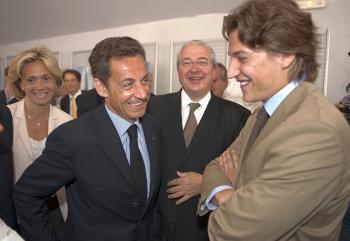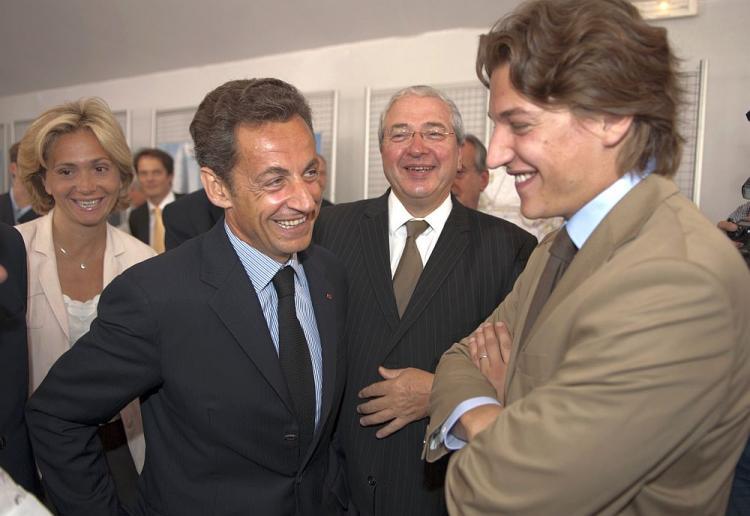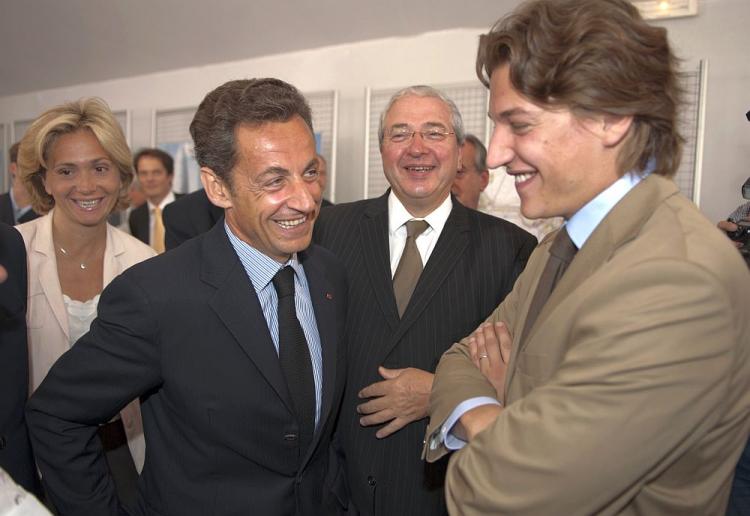PARIS—The bitter attacks against French President Nicolas Sarkozy’s second son, Jean Sarkozy, can be summed up by the headline of French newspaper Liberation, “Daddy is the French President.”
Jean Sarkozy, 23, looks set to be appointed head of EPAD, the public organization managing “La Defense” business district at the western corner of Paris. In France, the likely appointment of Sarkozy by EPAD’s board has turned into a state affair: EPAD is promoting the development of the biggest business district in Europe, with more than 150,000 employees, and Jean Sarkozy is a very young politician in his second year of law school.
Accusations of nepotism have surged this past week from all political camps, including members of the president’s own UMP Party, where dissenting voices are now saying that this is the “excess drop in a full glass of such things.”
The position taken by Jean Sarkozy was until today assumed by Patrick Devedjian, minister for economic recovery, who has been kindly asked to leave his seat since exceeding the age limit for the job. According to l'Express newspaper, Prime Minister Francois Fillon was preparing a decree to modify the age limit to allow Devedjian to stay in place until the age of 65—a move that would have been blocked by the Elysee presidential palace.
Centrist leader François Bayrou, quoted by Le Monde newspaper, charged that the appointment struck at the very heart of Frency society.
“All the pillars that have sustained the construction of our country—these principles of decency and reason are crumbling down. This can only remind us of the Roman Empire,” he said.
But the young Sarkozy counters that his previous election to city council and rise through the ranks of the UMP party show he has established his own political footing.
“No matter what I'll be doing, I will be criticized,” said Sarkozy. On Tuesday, Sarkozy told France 3 television, “I’m an elected individual as any other, no matter what my name or my age are.”
French President Nicolas Sarkozy himself decided to comment on the controversy, saying to the French press that it was not good that his son was being excessively criticized.
Prime Minister Francois Fillon also came to the defense of “Prince Jean,” as the international media has named him, insisting on the fact that “Jean Sarkozy has been elected, first by Hauts-de-Seine [a French department bordering Paris] voters, then by his peers to become the head of majority camp in the Hauts-de-Seine departmental council. Now he is named to take the presidency of EPAD. This is an election. This is a competition.”
That point has not been enough to convince the public, the press, or the political spheres that Jean Sarkozy was not simply lifted to an unduly high level of responsibility because of the firm will expressed by his father.
L'Express quotes Nicolas Sarkozy saying, during a speech on secondary school reform on Oct. 14, that the secondary school system started in 1802 “was the end of birth privileges. It meant that to succeed in France, the important thing was not to enjoy birth advantages, but to work hard and to make proof of one’s own value by studies.”
Several French media are now using the quote as a contextual highlight of an alleged difference between presidential statements and acts.
Jean Sarkozy, 23, looks set to be appointed head of EPAD, the public organization managing “La Defense” business district at the western corner of Paris. In France, the likely appointment of Sarkozy by EPAD’s board has turned into a state affair: EPAD is promoting the development of the biggest business district in Europe, with more than 150,000 employees, and Jean Sarkozy is a very young politician in his second year of law school.
Accusations of nepotism have surged this past week from all political camps, including members of the president’s own UMP Party, where dissenting voices are now saying that this is the “excess drop in a full glass of such things.”
The position taken by Jean Sarkozy was until today assumed by Patrick Devedjian, minister for economic recovery, who has been kindly asked to leave his seat since exceeding the age limit for the job. According to l'Express newspaper, Prime Minister Francois Fillon was preparing a decree to modify the age limit to allow Devedjian to stay in place until the age of 65—a move that would have been blocked by the Elysee presidential palace.
Centrist leader François Bayrou, quoted by Le Monde newspaper, charged that the appointment struck at the very heart of Frency society.
“All the pillars that have sustained the construction of our country—these principles of decency and reason are crumbling down. This can only remind us of the Roman Empire,” he said.
But the young Sarkozy counters that his previous election to city council and rise through the ranks of the UMP party show he has established his own political footing.
“No matter what I'll be doing, I will be criticized,” said Sarkozy. On Tuesday, Sarkozy told France 3 television, “I’m an elected individual as any other, no matter what my name or my age are.”
French President Nicolas Sarkozy himself decided to comment on the controversy, saying to the French press that it was not good that his son was being excessively criticized.
Prime Minister Francois Fillon also came to the defense of “Prince Jean,” as the international media has named him, insisting on the fact that “Jean Sarkozy has been elected, first by Hauts-de-Seine [a French department bordering Paris] voters, then by his peers to become the head of majority camp in the Hauts-de-Seine departmental council. Now he is named to take the presidency of EPAD. This is an election. This is a competition.”
That point has not been enough to convince the public, the press, or the political spheres that Jean Sarkozy was not simply lifted to an unduly high level of responsibility because of the firm will expressed by his father.
L'Express quotes Nicolas Sarkozy saying, during a speech on secondary school reform on Oct. 14, that the secondary school system started in 1802 “was the end of birth privileges. It meant that to succeed in France, the important thing was not to enjoy birth advantages, but to work hard and to make proof of one’s own value by studies.”
Several French media are now using the quote as a contextual highlight of an alleged difference between presidential statements and acts.







